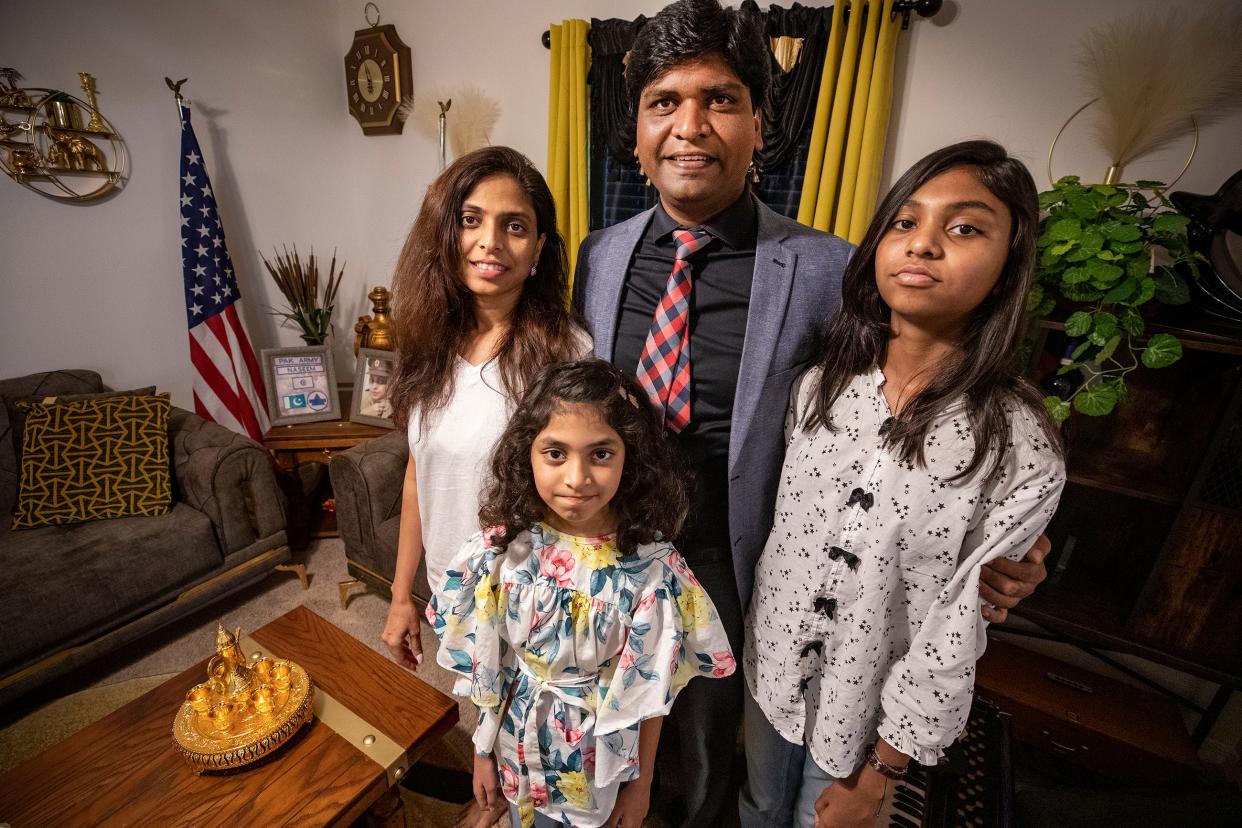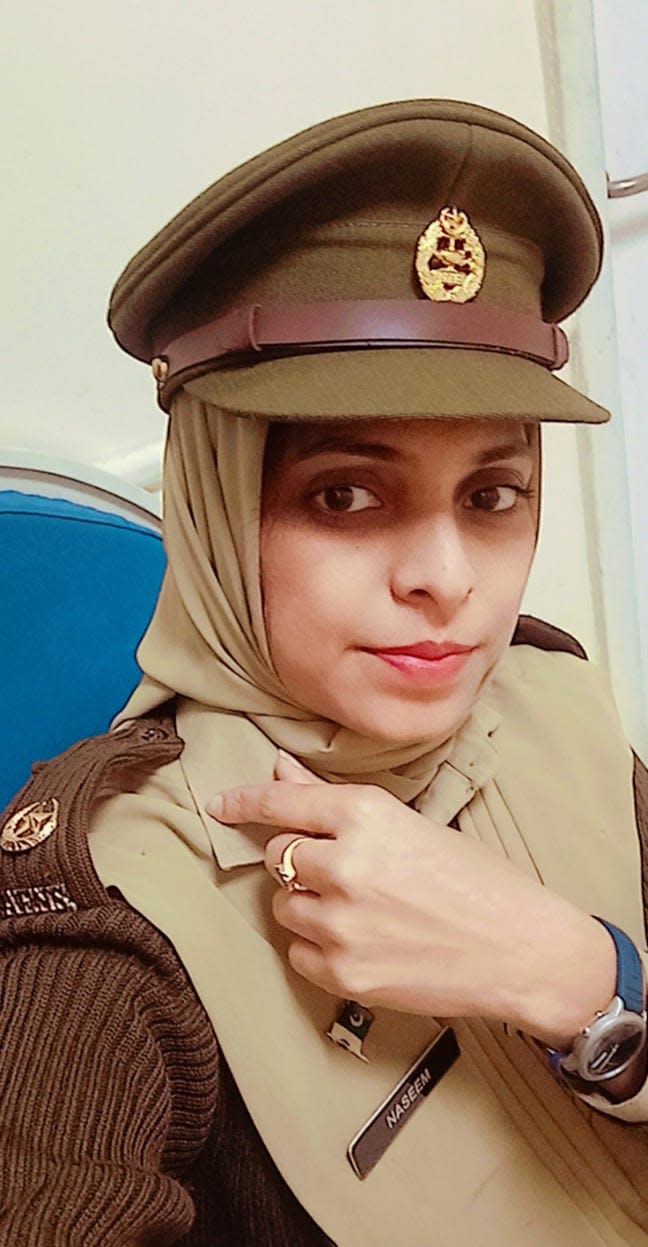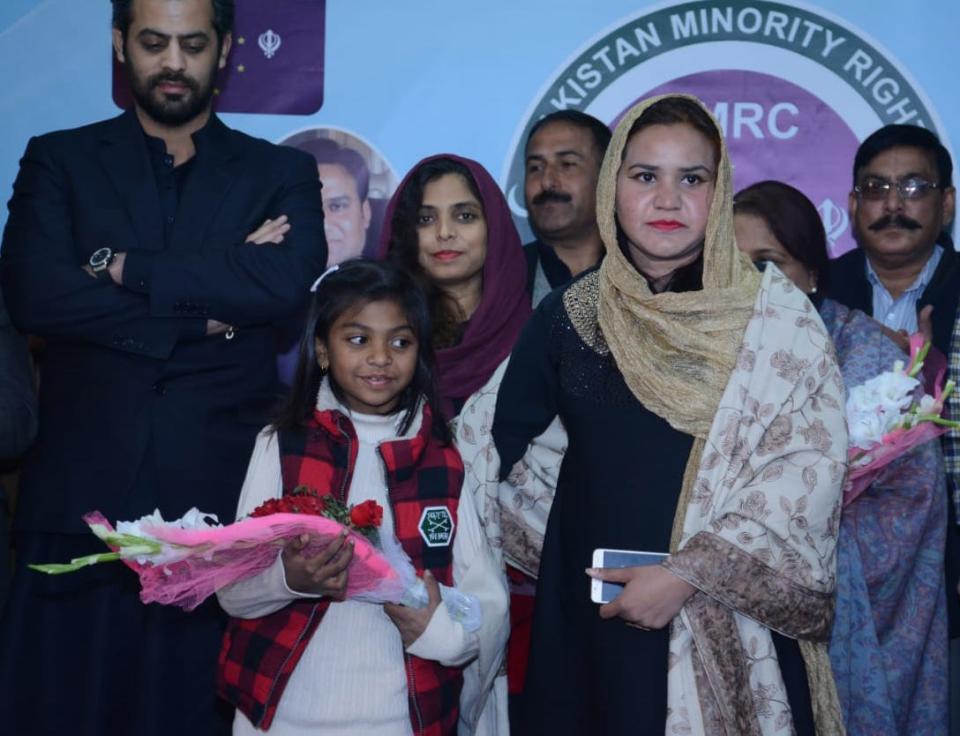'God has blessed me': Religious refugee from Pakistan welcomes wife, daughters to Lakeland

LAKELAND — For six years, Junaid Saqib’s wife and two daughters knew him only as a face on a computer screen and a voice on the phone.
Separated by nearly 8,000 miles, Saqib and his family existed in different realms. As his daughters prepared for school in the morning in Pakistan, it was late at night in Lakeland, where Saqib resided.
And for six years, Saqib missed receiving “cozy hugs” from his daughters.
The family rupture has now been repaired. Saqib’s wife, Naseem Naz, and their daughters — Imsaal “Cherry” Junaid, 11, and Mishmal Junaid, 9 — arrived in the United States on May 2 and are now living with Junaid at his home in North Lakeland.
“It’s a great thing for us that we are together,” Naz said. “It’s major happiness for our family.”
Saqib fled his native Pakistan in 2017 after deciding it was unsafe for him to remain. As a Catholic, he was among only 1.6% of the Pakistani population who identify as Christians in a nation where Islam is the official state religion. In 2003, Saqib founded the Pakistan Minority Rights Commission, and he gained national prominence as an advocate for the fair treatment of religious minorities.
That status put him at risk in Pakistan, especially as the Pakistani Taliban — an ally of the pro-Muslim militant organization in neighboring Afghanistan — emerged and began carrying out attacks.
In 2013, suicide bombers affiliated with the Taliban detonated blasts in a Peshawar church, killing an estimated 300 people, including 11 of Saqib’s relatives, he said. Despite such violence, Saqib and the PMRC continued to operate. Meanwhile, Saqib became a minority spokesman for a political party and twice ran unsuccessfully for a seat in a provincial parliament.
Saqib organized a demonstration that drew coverage from news outlets, and he appeared on TV saying the PMRC would oppose terrorism against non-Muslims. He soon began receiving threatening phone calls during the night, he said, and he found a letter slipped under his door warning that he would be killed if he did not desist.
Saqib decided to leave Pakistan, even though it meant separating from his wife and daughters, then ages 2½ and 4½. After an interval in Thailand, he came to the United States, supported by a Canadian pastor and missionary who had met him during a trip to Pakistan.
That pastor, a winter resident of Lakeland, asked a retired couple, Jim and Jan Plumb, if they might be able to host Saqib as he sought a home in the United States. They agreed, and Saqib became a guest in their home in March 2016.
Painful separation
After settling in Lakeland, Saqib stayed in touch with his family through daily videochats and text messages. He talked to Cherry (a longtime family nickname) and Mishmal as they prepared to leave for school. The girls attended a Catholic school in which all students learned English, but the family communicated in Urdu, Pakistan’s national language.
At first, Naz told the girls that Saqib had left simply to take a job in another country, not wanting to explain about religious persecution when her daughters were so young.
Naz served as a medical officer in the Pakistan Army, working in cardiac units. Photos displayed in the family’s home depict her in various military uniforms — always wearing a headscarf, as the Army required women to do, even if they aren’t Muslims.
Naz, who spent 18 years in the Army, said she regularly received postings to other provinces for intervals as long as six or eight months. She periodically gained leave periods of 10 to 15 days, sometimes traveling 12 hours each way to be with her daughters.
“It was a hard thing for me and for my kids, as I was a working woman and doing my job without husband and brought up my kids without husband,” Naz said, sitting in the parlor of the house her husband recently bought. “But his family has been a lot (of help) in all this, but definitely it was a hard time for me.”
Naz said that Saqib’s parents and siblings provided crucial support in caring for Cherry and Mishmal during her absences.
As Cherry grew older, she learned about her father’s work with the PMRC and became active with the organization. She served as a figurative substitute for Saqib, attending ribbon cuttings and other events as the PMRC opened new offices.
Previously Pakistani refugee fears Taliban will bring bloodshed
An electronic screen in the family’s home displays a slide show of images, some of them photos of Cherry at PMRC gatherings with members of the Pakistan parliament.
“Cherry was like my legacy in Pakistan when I left, because she went to different cities and spoke on behalf of me to the public rallies,” Saqib said. “And when she came to know why my dad left the country, she was upset, like — 'Why do we struggle a lot for the country and still he has to leave the country?' So she couldn't handle that. But she said, ‘I'm not quitting. I will keep forwarding to take this job to help people so nobody can say ‘Khaan’ is dead. ‘Khaan’ is still alive.”
Khaan is an honorific nickname given to Saqib by fellow advocates for minority rights, adapted from a historic title for a military chief or ruler.
Following father's example
Asked if she felt any fear in following her father’s advocacy, Cherry shook her head and then spoke in a mix of English and Urdu.
“She said she was not scared because she’s Khaan’s daughter,” Saqib said, prompting a laugh from Cherry.
The 12-year-old, dressed in American style in jeans and a collared top, said that friends were curious about her absent father.
“They asked about my dad, and I told them he was the chairman (of the PMRC),” she said in English.

When her friends didn’t believe her, Cherry shared photos of her father from PMRC events.
“They were shocked,” she said.
As a military member, Naz was mostly barred from involvement in political issues, though she did sometimes appear at PMRC events.
Saqib has remained one of the group’s leaders even while living in the United States. He communicates regularly with other PMRC members, most recently working to gain protection for a Christian family he said was facing physical harassment from Taliban members.
During most of the time after Saqib’s departure, Naz and the girls lived on military bases, affording them a level of security. For the final two years, though, the girls lived with Saqib’s parents in Peshawar, often called one of the world’s most dangerous cities.
'These are proud people' Lakeland couple help displaced Afghans in New Mexico
Saqib now has permanent resident status in the United States, allowing him to petition U.S. Citizenship and Immigration Services to allow immediate family members to join him. He said the immigration process took much longer than he expected, but Naz and the girls eventually received visas. They are now seeking permanent resident status.
Naz and the girls left from the Islamabad airport, joined by about 20 weeping relatives, she said.
“We had our relatives, brother and sisters and mother and father, all the family,” Naz said. “It’s very hard to leave them. But we have to, because Junaid is here, and we have to reunite.”
Settling in Lakeland
Saqib flew to New York to meet his wife and daughters as they arrived. The family spent about 10 days as tourists, visiting Niagara Falls and sightseeing in New York City, before coming to Lakeland.
Saqib had provided virtual tours of the neighborhood during his chats with his family, giving Naz and the girls a feeling of familiarity before they even arrived.
Mishmal, a petite girl with dark, curly hair, seemed shy and spoke little during an interview with the family, impatient to resume watching an Indian comedy program on Netflix.
While Saqib is thrilled to receive “cozy hugs” from his daughters again, he acknowledged that the adjustment has been difficult for Mishmal, who was only 2½ when she last saw him in person.

“She knows him but is not strongly connected with him,” Naz said. “That's why there’s a little bit of trouble with her. When she saw the first time her father, she was a little …”
“She gave me a weird look,” Saqib said.
Generally, though, Naz and the girls give the impression of adapting quickly to their new home. Mishmal and Cherry have become regulars at a community swimming pool, and the family has explored such local restaurants as Chili’s, Golden Corral, a Chinese buffet and Curry Mango, whose Indian cuisine Saqib said is similar to the traditional Pakistani recipes the family makes at home.
“They like spicy food,” Saqib said of the girls. “American food is — it's different.”
Cherry finished fifth grade and Mishmal second grade in Pakistan, and Saqib has been seeking to enroll them in a local Catholic school. He credited Florida Rep. Jennifer Canady, R-Lakeland, with helping the girls secure scholarships through Step Up for Students, a nonprofit that administers state-supported financial aid to attend private schools.
Saqib said he expected the girls to begin next week at St. Anthony Catholic School in North Lakeland, though their enrollment had not been confirmed as of Thursday.
“I came to know that mission work and helping people is not a piece of cake,” Saqib said. “You have to sacrifice, and I sacrificed for six years, being apart from my family, my kids, and that hurts me sometimes. But whenever I thought, like, how many people I helped, then I have more stability in myself and that was OK. I lost my family love, my time, my cozy hugs with the kids. But finally God has blessed me with them again.”
Gary White can be reached at gary.white@theledger.com or 863-802-7518. Follow on Twitter @garywhite13.
This article originally appeared on The Ledger: Religious refugee from Pakistan reunited with wife, kids in Lakeland

